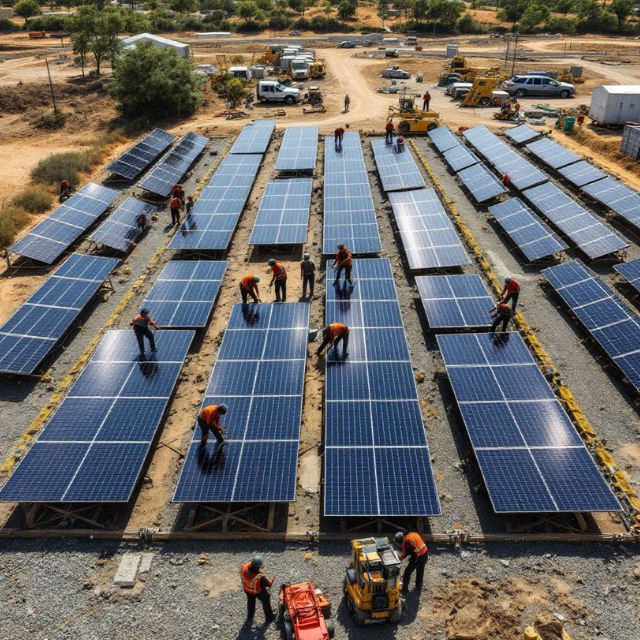The integration of artificial intelligence (AI) in the solar industry is revolutionizing how solar energy systems are managed and optimized. As we look into 2024, AI trends are driving significant advancements in solar technologies, leading to increased efficiency, predictive maintenance, and smarter grid integration.
Advancements like Sora AI’s text-to-video generator also represent a move toward more accessible educational tools that can promote awareness of sustainability initiatives and solar adoption among consumers. Leveraging such platforms to create informative, engaging content reinforces a brand’s commitment to driving progress through broader public engagement.
This article explores these trends, providing insights into how AI technologies are reshaping the solar landscape. Key focus areas include:
- AI-powered solar farm optimization: Improving solar panel efficiency and output through machine learning models
- Solar energy management: Using smart sensors, data analytics, and AI-driven forecasting tools
- Automation solutions: Enhancing solar operations and competitive advantage via automation and AI
- Predictive maintenance: Reducing environmental impact by using AI diagnostics and analytics
- Grid integration: Enabling smarter solar integration into energy grids with AI

Analyze AI-Powered Solar Farm Optimization
Artificial intelligence and machine learning are being utilized to optimize solar farms through innovative systems like IBM’s Watson IoT for renewables. These AI-powered solar farm optimization systems analyze weather patterns, performance data from solar panels, and other variables to improve efficiency.
Specifically, machine learning models can adjust the angles of solar panels throughout the day to maximize solar absorption as the sun’s position changes. Researchers have demonstrated up to a 20% performance boost using this approach.
The Solar Energy Technologies Office (SETO) 2020 report also highlighted several AI achievements in solar efficiency. For example, deep reinforcement learning algorithms developed by startup Ensemble Energy have increased renewable energy production at solar plants by up to 5%.
Explore AI Innovations in Solar Energy Management
In addition to optimization at the solar farm level, artificial intelligence is driving better solar energy management through improved monitoring and forecasting.
Smart sensors combined with data analytics platforms now enable intelligent tracking of solar panel performance metrics like voltage and current output changes. By applying machine learning algorithms to these solar performance analytics, issues can be predicted before they cause failures.
AI-driven solar power forecasting tools like grids.ai also allow energy companies to anticipate solar production multiple days in advance based on weather data. This is incredibly valuable for grid integration and matching supply with demand.
According to the World Economic Forum, over $150 million was invested globally in AI solutions for renewables management in just the first half of 2022.
Evaluate Solar Industry AI Automation Solutions
The application of artificial intelligence extends beyond solar farms and energy management to the automation of key processes across solar companies.
From automated customer document processing to AI chatbots handling inquiries, these solar industry AI automation solutions are saving costs and enhancing operations. Startups like Softomotive and UBDI are leading the charge here.
At utility-scale solar farms, AI programs are taking over tasks like cleaning solar panels and adjusting equipment angles for better alignment. These solar farm automation systems allow human operators to focus on higher-level supervision and strategy.
Early results indicate the ROI is compelling. Chinese solar firm LONGi reported a 7% jump in annual revenue in 2021 after deploying AI-enabled robots at key solar plants.
Discuss Predictive Maintenance and Solar Installations
A vital application of AI analytics involves identifying potential faults and issues with solar installations before they occur. This predictive maintenance approach prevents unplanned downtime and inefficiencies.
Given the complexity of variables impacting solar performance, from weather to grid stability, AI-based solar diagnostics provide invaluable insights. Machine learning algorithms can baseline expected energy outputs and notify human technicians when anomalies appear.
Over time, the amassed performance data from millions of global solar installations has powered increasingly accurate AI diagnostics and maintenance recommendations. This directly translates into improved uptime, lower costs, and reduced environmental impact due to enhanced solar efficiency.
Detail AI-Enabled Solar Grid Integration
The intermittent and variable nature of solar power has historically complicated grid integration. However, AI-enabled solar grid integration technologies are now mitigating these issues.
In particular, artificial intelligence allows grid operators and distributed energy management systems to dynamically optimize solar power flow into the wider grid. By analyzing weather forecasts and predicting loads, solar output can be matched appropriately.
The Department of Energy has invested over $40 million into projects focused specifically on using AI planning tools to facilitate increased renewable energy integration without destabilizing grid infrastructure. Achieving higher solar penetration in energy grids will be critical as the world transitions to sustainable power.
Future Prospects and Public Awareness
Based on current investment trends, the global market for solar industry AI solutions is projected to surpass $1.3 billion annually by 2028. Key drivers include enhanced efficiency, lower operating expenses, and competitive differentiation.
Emerging use cases involve increasingly advanced applications like automated solar panel cleaning drones, smart inverter retrofits, and AI-optimized energy storage solutions. Integrating solar operations with adjacent industries also offers new opportunities.
However, for the solar sector to reach its full potential, public awareness and engagement remains critical. User-friendly educational platforms like Sora can leverage AI to create accessible video content that promotes sustainability initiatives and solar adoption to a broad audience.
The integration of artificial intelligence and solar energy management has unlocked immense value, paving the way for a smarter and more optimized renewable future.
As demonstrated across solar farms, power grids, and associated infrastructure, leveraging AI trends like machine learning, automation, and advanced analytics will be instrumental as solar technology continues to advance.
Stakeholders in the solar industry should prioritize investment in AI-driven solutions to remain at the forefront of innovation while establishing a competitive advantage rooted in increased efficiency, reliability, and intelligence.



